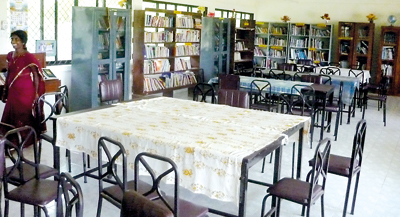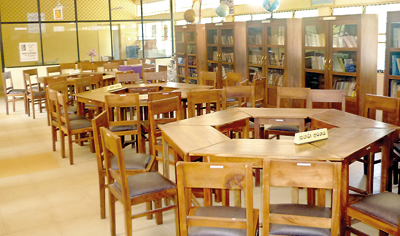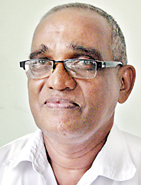News
Teacher-librarian project: Yet another mess up by the Education Ministry
= Ministry official’s disregard of Cabinet decision renders degree worthless
Yet another blunder by the Ministry of Education (MoE) has caused thousands of teacher-librarians in Sri Lanka to abandon their specialisation.
After more than a decade, the MoE has yet to recognise teacher-librarians’ qualifications – a specialised teaching field created in the early 2000s to achieve education goals, leaving many teacher-librarians unable to advance their careers and many school libraries either closed or without professional supervision.
Second General Education Project (GEP2)
In the ’90s, the MoE decided to reform education in Sri Lanka, following criticism that the system was too syllabus-centric and exam-based. To rectify the problem and to increase student access to information, the MoE, then under Minister Richard Pathirana, with a World Bank (WB) grant, undertook to develop many areas of education, including developing school libraries.
![]()
One of the eight components of the GEP2 was to develop School Libraries and Resource Centres (SLRCs), to “support an activity-based curriculum, and to encourage the reading habit in school and community”, by implementing a National School Library Policy. The National Institute of Library and Information Sciences (NILIS) was established within the University of Colombo, primarily to train SLRC staff.
The project totalled US$ 83.4 million, according to the 2006 WB project completion report, with US$ 5.9 million initially allocated for the library component.

No teacher librarians at these partially opened libraries at the J affna Central College
As part of reaching its education goals, the project coordinators decided to establish 4,000 SLRCs and recruited 4,000 teachers to be trained as Teacher-Librarian and Library and Information Science Teachers.
“Teacher-Librarians not only manage the library, they also teach,” NILIS Director and former Sri Lanka Library Association President Upali Amarasiri told the Sunday Times. “This way, teachers know the curriculum very well and they know other teachers, they also know what books the students need for an exam or subject. Hence, it’s better than having an outsider librarian come in. Therefore, Teacher-Librarians should be on par with regular teachers in designation, salary and promotional prospects, similar to other countries where SLRCs are successful.”
In 1999, NILIS was established to train the teacher-librarians, providing postgraduate degrees, diplomas and certificates in teacher-librarianship. The WB project provided the necessary international and local expertise and trained the original NILIS and MoE school library staff internationally. The GEP2 project completion report noted “a much stronger school library system with trained teacher-librarians” as a key accomplishment.
The government also established a School Library Development Unit (SLDU) within the MoE to supervise the SLRCs, within the central government and provincial councils.
Teacher librarian cadre issue
While the NILIS was training teacher-librarians, the MoE failed to include a new cadre for teacher-librarians in the teacher services minutes, which governs teacher qualifications, promotions, service requirements, eligibility for leave etc. for all teachers in the country.
“Even after all these WB funds, experts and new services, the MoE didn’t include this requirement in the teacher services minutes about the teacher-librarians,” Mr. Amarasiri said. “So that, when the teacher-librarians get their degrees at NILIS, when they go back there are no promotions, no careers unlike for regular teachers.

Wellassa National School Bibile
This was a minor technical adjustment the MoE should have attended to at the inception of the project, which they either overlooked or forgot due to carelessness.”
When former NILIS director Dr. Pradeepa Wijetunge went to the MoE, officials admitted their oversight, and sought to amend it by submitting a Cabinet paper in 2006. The Cabinet appointed a committee to look into the matter, and in 2009, they finally approved teacher-librarianship to be included in the teacher services minutes, when the MoE was under Susil Premajayantha.
“The Cabinet decision, basically, was to revise the teacher services minutes to rectify the problem and asked the MoE to take action,” Mr. Amarasiri said.
Action by MoE was not immediate and after four years, they are still finalising it, he claimed.“It is unheard of to wait 12 long years to introduce a minor change into the teacher services minutes to recognize the teacher-librarian cadre which was introduced by the MoE itself, and to take another four years to implement a Cabinet decision,” Mr. Amarasiri said.
“Now the trained teacher-librarians can’t wait like that, they are young graduates with no future once they graduated,” he added. “The NILIS doesn’t get as many prospective students as before, and if anything, the students have to bear the course fees themselves.”
Problems within the Ministry
For several years, the MoE has been saying the situation will be fixed within a month or two, Mr. Amarasiri claimed. The outgoing Education Secretary R.N. Gunasekara even wrote a memo to include teacher-librarians in the next revision of the teacher services minutes.
This April, Mr. Amarasiri, along with NILIS Chairman cum University Grants Commission (UGC) Vice Chairman Prof. Ranjith Senaratne, met with Mr. Gunasekara to discuss the matter. The former secretary was keen on solving the problem, but a senior assistant secretary presented a letter to them from the Salaries and Cadre Commission (SCC) from April last year, denying teacher-librarianship a special cadre.
Mr. Amarasiri accused the senior assistant secretary of deliberately sabotaging the process for personal reasons, by withholding the SCC letter for almost a year, and also going out of the way to create difficulties for the project. The official in question was not available to comment on the accusations.
When the Teacher-Librarian Union (TLU) went to the MoE and met the senior assistant secretary to discuss the matter, he told them to change their subject and get a different degree to continue teaching, claimed TLU head Niranjala Wikramathileka.
“We came from far off places, spending about Rs 100,000 to get a Degree in teacher-librarianship,” she said. “We can’t afford to get another degree, and we have family commitments. This is a great injustice done to us.”
In 2011, the TLU made an official complaint against this officer and the Sri Lanka Library Association sent a letter requesting the Education Secretary to relieve this official from any school library responsibilities.
“Had the Secretary listened to the SLLA request, this unfortunate situation wouldn’t have arisen,” Mr. Amarasiri said.
Last year, the NILIS answered summons by the COPE seeking a solution. The COPE recommended that they write to the Education Minister through the UGC, and settle the matter.
“We sent the letter, but there has been no response from the MoE to date,” Mr Amarasiri said. Consequences
Teachers in training were heavily affected by the situation, like school teacher Asoka Senaratne who was part of the first teacher-librarian batch at NILIS in 2005.
“Back then, teacher-librarianship was heavily promoted,” he told the Sunday Times. “We were told that positions were available for a lucrative career. However, there was a problem with approving the teacher-librarian designation, but we were assured that the Ministry was fixing the problem.”
Mr. Senaratne said that, like him, many of his colleagues have resorted to regular teaching. “The MoE didn’t recognise Teacher-Librarians same as regular teachers, therefore, a lot of us had to leave the field,” he said. “The MoE didn’t help us, and we were not properly informed of the situation.”
SLDU Director Anura Jayalath de Silva told the Sunday Times that, in 2006, the SLDU appointed 2,500 teacher-librarians, but do not know why some of them have resorted to regular teaching. He said that school principals appointing teacher-librarians to fill teacher vacancies may be a possible reason.
“As a result, many school libraries are now either closed or run by untrained people,” claimed Mr. Amarasiri.
Mr. Senaratne said his school library is run by an untrained person despite him having the training.
The TLU filed a Human Rights complaint in 2011, citing “administrative anomalies”. The Human Rights Commission of Sri Lanka didn’t accept their claim due to a technicality, and the complaint has been in appeal for about two months, Ms. Wikramathileka said.
It hasn’t helped the situation that officials are constantly changing within the MoE. There have been several Ministers of Education since the project started, and the SLDU has had at least five directors since conception.
“They keep appointing new directors at SLDU, and while some of them are very helpful, some have no idea about Teacher-Librarianship and the issues facing us, which makes it challenging to work with them,” Mr. Senaratne said.
Mr. Amarasiri, Mr. Senaratne and Prof. Russell Bowden, a library consultant and a member of the Board of Management at NILIS, told the Sunday Times that the WB grant has been wasted and many futures halted because of a “flaw within the MoE.”
“The whole thing is terrible; millions of dollars in WB fund wasted because the MoE failed to recognise teacher-librarians,” Prof. Bowden said. “One person within the MoE has managed to ignore a Cabinet decision to create this situation. Minister of Education should be keener to investigate this situation.”
WB Human Development Unit Lead Education Specialist Harsha Aturupane told the Sunday Times that it’s the government’s responsibility, not the Bank’s, to ensure that the GEP2 project goals are achieved. “Basically, what we have to do is build the libraries,” he said. “To provide functioning libraries and paying teacher-librarian salaries is up to the government.”
Former SLDU Director Sepala Kuruppuarachchi told the Sunday Times that teacher-librarians were “essential” for the current curriculum.
“The way this was designed long ago, the current curriculum cannot be implemented without Teacher-Librarians,” he said.
Minister of Education Bandula Gunawardana and Education Secretary S.M. Gotabaya Jayaratne were not available for comment.
The sorry state of model SLRCs
In each province one model School Library Resource Centre was built in addition to the 4000 SLRCs.
This model library, normally a two-storey building, comprises books and printed materials in one floor and audio-visual material and computers/internet facilities in two sections in the other floor. The model SLRC’s role is to be an example to the other SLRCs of the province.
Of the 9 model SLRCs only one is in full operation at present — the Rangiri Dambullla National School’s SLRC in the Central Province. There is a teacher librarian and two library attendants there.
The following list explains the status of the other model SLRCs:
1. Jaffna Central College — model SLRC for the Northern Province (this was built prior to the joining of the North and Eastern Provinces). No teacher librarian. Only partially open.
2. Debarawewa National School — model SLRC for Southern Province. No teacher librarian, either closed or partially open without any services
3. Galgamuwa National School — model SLRC for North-Central Province, No teacher librarian, partially closed, no services
4. Princes of Wales College, Moratuwa — model SLRC for western Province. No teacher librarian, partially open, no proper services
5. Medirigiriya National School — model SLRC for North-Central Province. No teacher librarian, partially open.
6. Aligar National School, Eravur — model SLRC for Eastern Province. No teacher librarian, partially closed.
7. Embilipitiya National School — model SLRC for Sabaragamuwa Province. The principal has taken over a floor of the SLRC to set up his office. No teacher librarian and partially open.
8. Wellassa National School, Bibile — model SLRC for Uva Province. No teacher librarians, partially closed.
Most of these model SLRCs are run by peons or other minor staff as there are no full time teacher librarians.

























